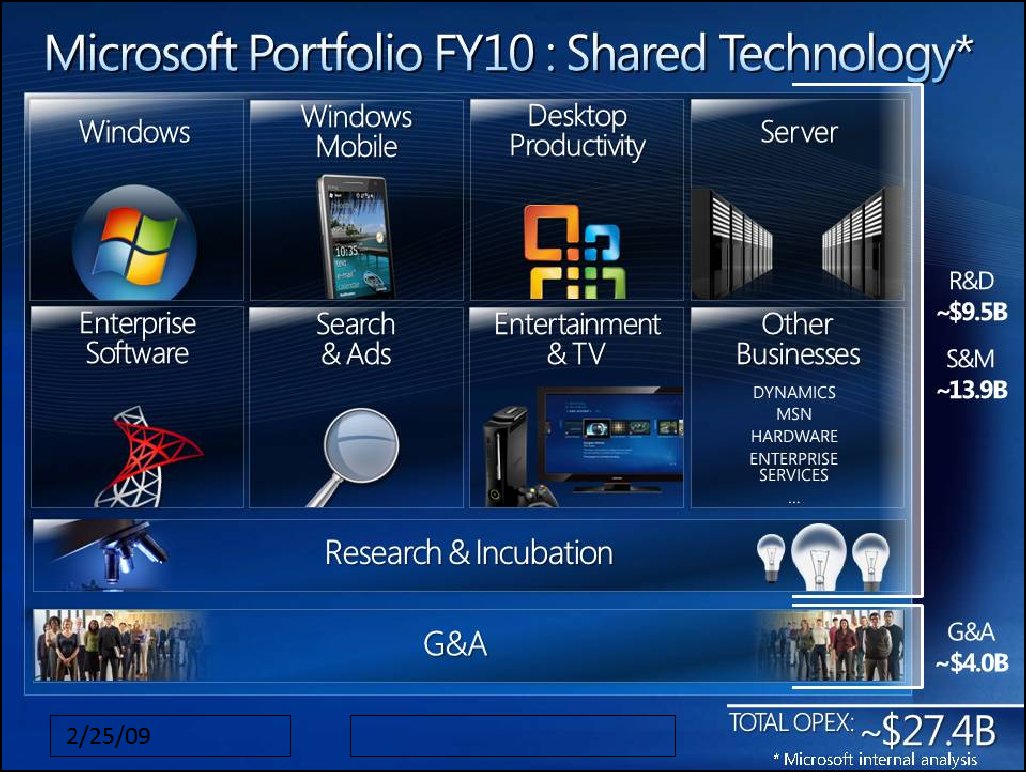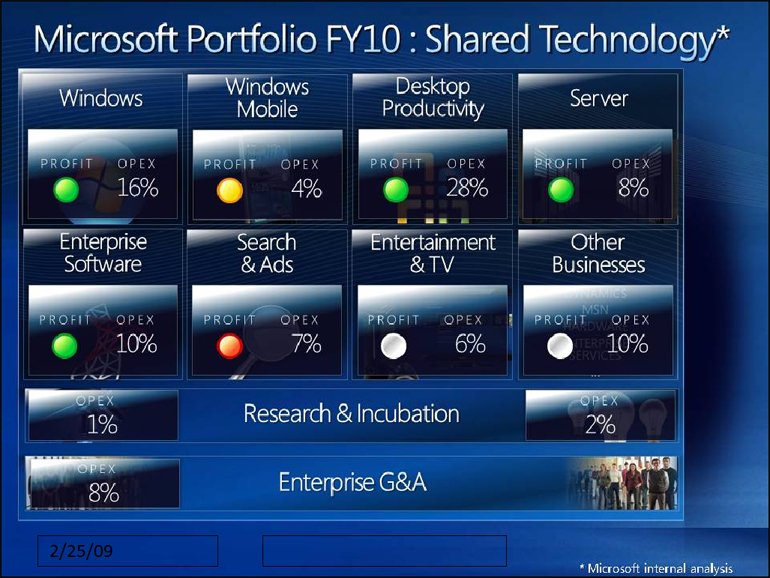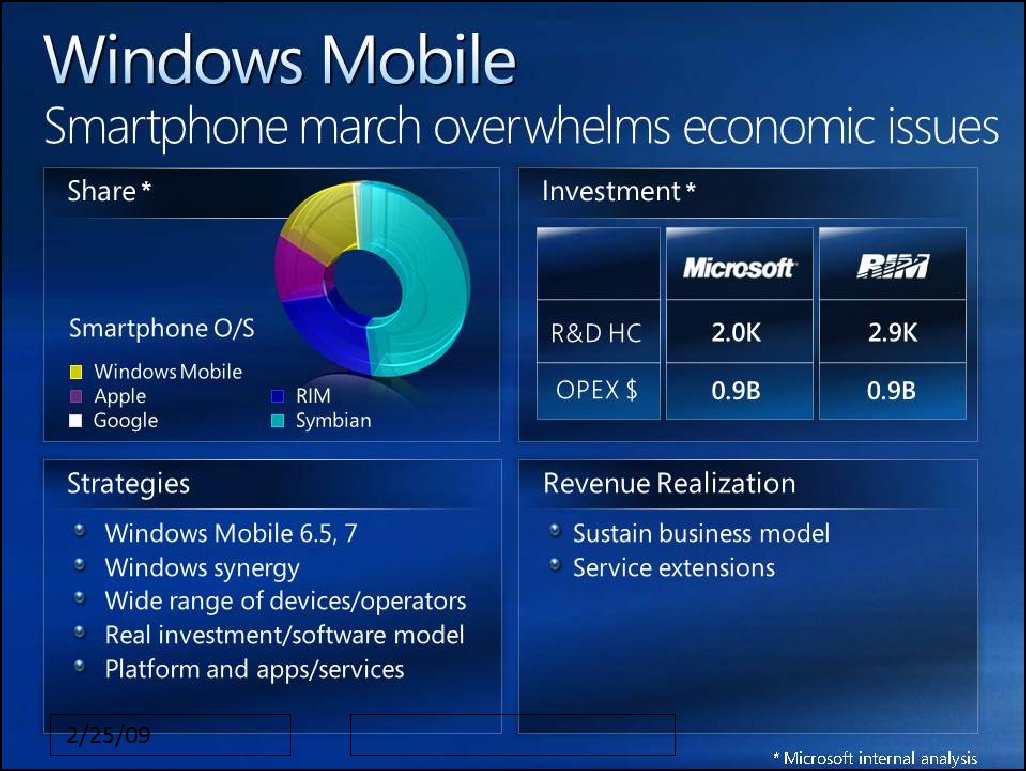Ballmer speaks, and we translate

All the latest news, reviews, and guides for Windows and Xbox diehards.
You are now subscribed
Your newsletter sign-up was successful
We touched very briefly a little while ago on Microsoft CEO Steve Ballmer's seven priorities for the upcoming fiscal year, or what Ballmer calls the "Big seven businesses" of Microsoft.
After digesting Ballmer's presentation at the Strategic Update Meeting (transcript link), let's dive a little deeper into what's going on.
We'll warn you in advance: This mostly isn't sexy stuff. There are no shiny phones on the other side of this story. There is a little talk of Windows Mobile 7, but nothing groundbreaking. But the steps being taken are important to us, and important to Windows Mobile, to better understand where it is Ballmer and Microsoft are taking things.
Our place in the Microsoft world

As discussed in our previous post, Ballmer breaks down the Microsoft empire into seven basic categories:
- Windows
- Windows Mobile
- Desktop productivity
- Server
- Enterprise software
- Search & ads
- Entertainment and TV
Those are the Big 7, which were the focus of the Strategic Update Meeting. The bottom line? Microsoft plans a total operating expenditure of about $27.4 billion for FY2010 (July 2009 - June 2010) for these "shared technologies." Shared technology, you say? It's no great secret that we expect Windows Mobile 7 and Windows 7 to at least share some building blocks, which helps explain the recent push to rename Windows Mobile phones to just a Windows Phone. Ballmer explains:
"If you take a look at Microsoft and what we invest in, in a sense you could say there's seven big businesses. ... Windows, Windows Mobile, and those two will become I'd say closer in many ways. There's still a real distinction between what's a phone and what's a PC. And yet the amount of technology that can be shared across that border continues to go up."
There you go. From the horse's mouth. Of course, what's good for the goose isn't always good for the gander. One of the larger complaints about Windows Mobile is that it's basically a mobile computer with a phone slapped into it. Start menu. Registries. Same ol' file structure. While that's fine for those of us used to poking around such things, it scares the hell out of others.
All the latest news, reviews, and guides for Windows and Xbox diehards.
Windows Mobile's profitability

Like any business, Microsoft doesn't just put out products and hope they do well. There are expectations to be met. Here we see the percentage of that $27.4 billion spent on the Big 7 businesses, and, using a stoplight motif, expectations of profitability. Says Ballmer:
"If you take a look at it in a different lens today, and you ask which of these businesses are profitable, let me actually say very profitable, profitable, somewhat unprofitable, and very unprofitable. Windows is very profitable. That's a green. Windows Mobile, Windows Mobile is somewhat unprofitable. That's a yellow. Desktop productivity very profitable, server very profitable, enterprise software very profitable, search and ads very unprofitable, entertainment and TV profitable. And these other businesses that support what we're doing in aggregate are just about profitable. They are profitable, but not a lot of money."
Windows Mobile, and the competition

And now, ladies and gentlemen, the show you've all been waiting for. When one CEO opens his mouth and speaks another company's name, sparks fly, and bloggers smile.
On the hardware side, Apple's got the mojo, Ballmer says, but Microsoft (and Android) has more "real market momentum":
"The truth of the matter is, I would say all of the consumer market mojo is with Apple, to a lesser extent Blackberry, and yet the real market momentum with operators and the real market momentum with device manufacturers seems to primarily be with Windows Mobile, and with Android."
Our frenemy Rene over at The iPhone Blog correctly points out, however, that Apple and Rim manufacture their own devices. So, yeah, the Samsungs and Acers of the world pretty much have to turn to Windows Mobile or Android for their smartphone operating systems. And, really, that's still fine with Microsoft and Ballmer. It's been written ad nauseum that Microsoft isn't in the game of manufacturing its own phones. Here's one more quote for that pile:
People ask me, will you build your own phone? Not our strategy to build our own phone. It's our strategy to sell software that we can use and support across a wide range of device manufacturers to encourage choice, choice in devices, choice in the operators. We have a positive price on our software. Google does not. I don't know how it is a sustainable thing to not have a positive price. And don't tell me you think it's search, because even when they win the Android business, they have to pay to have their search installed on that phone, just as we do, that's a competitive bid that the operators mandate. So we're going with a real price, with real investment, with a professional approach, and a positive price on software-based model.
Really, that's just a fundamental difference in the way the two companies do business. Google will develop something, get it out to the public, and then find a way to make money off of it. Microsoft? Eh, not so much.
Windows Mobile 7
Yeah, yeah, the headlines are flying. "Ballmer confirms Windows Mobile 7 for 2010!" This has already been reported 37 different ways. And while the when certainly is important, even more important is the what. Exactly what is Windows Mobile 7 going to be? What are we expecting? At the very least, more of a convergence between Microsoft's desktop Windows and Windows Mobile.
"We're extending our offer to include not only the core platform, but applications and services. We've made a nice release announcement last week of Windows Mobile 6.5. We've got Windows Mobile 7 coming next year. We're getting more and more synergy with Windows, so the browser improvements, et cetera, should be quite rapid. ... There will be really shared technology across Windows and Windows mobile. The browser is an example, the presentation surface is an example. Some day even the kernel will be an example."
One operating system to rule them all? Yeah, Apple's been doing that for a while now. But Microsoft's been building off the same mobile OS for a long, long time now, and it's far beyond time for something new. Maybe in 2010, we'll finally get it.
And this all means ...?
Like everyone else, Microsoft is positioning itself through one of the worst economies since we stopped using giant stores for currency. That's first and foremost. If you can't survive, you can't do business, and it doesn't matter what good ideas you have for the future. Windows Mobile 6.5 isn't the answer, and it really isn't intended to be. Windows Mobile 7 likely will be a make-or-break operating system for Microsoft. Yeah, it's still along ways off. But, again, it's really about more than just the operating system. It's about bringing it all together.
But consider this: Palm, as Dieter and Mike said over and over in the TreoCentral Treocast, spent months and months in the desert and now appears ready to emerge with the Pre. Microsoft's kind of in the same situation, though its desert isn't anywhere near as barren as Palm's. And that's as frustrating as it is helpful. The tools are all there. It's just a matter of getting them all to work together.
The question is, how long are people willing to wait? And will they coming running back should Microsoft make good with Windows Mobile 7?

Phil is the father of two beautiful girls and is the Dad behind Modern Dad. Before that he spent seven years at the helm of Android Central. Before that he spent a decade in a newsroom of a two-time Pulitzer Prize-finalist newspaper. Before that — well, we don't talk much about those days. Subscribe to the Modern Dad newsletter!
